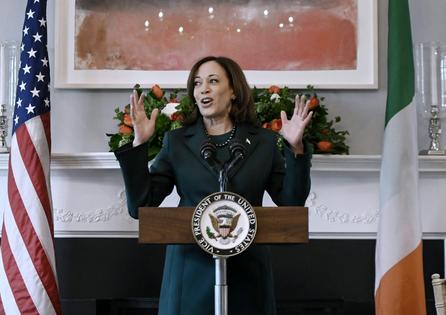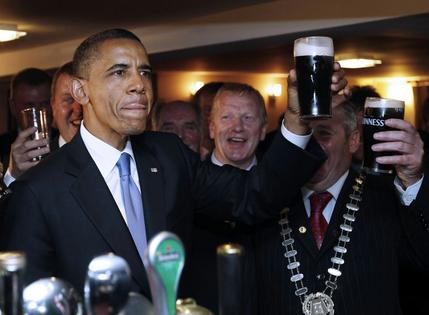Kamala Harris’ purported ancestry highlights complicated backstory of Irish identity and enslavement
Published in Political News
When Barack Obama was elected president, the people of Moneygall in Ireland celebrated. Birthplace of Obama’s great-great-great-grandfather on his white mother’s side, the village commemorated the victory – and a later visit from the 44th president – with pints of Guinness and a kitschy trade in “O'Bama” memorabilia.
In contrast, the response in Ballymoney to claims of Irish ancestral ties for a would-be U.S. president has been more muted.
In 2018, the Black father of Democratic presidential candidate Kamala Harris, the Jamaican-born professor Donald Harris, wrote that the family was descended from white enslaver Hamilton Brown. Brown was born in Ireland in 1776 before moving to the then-British colony of Jamaica.
If Donald Harris’ account of his family history is correct, it is likely that, as was true with American abolitionist and former slave Frederick Douglass, the Black mother in question – and Harris’ ancestor – was a woman on one of Brown’s plantations. In such cases, mothers and children were often separated shortly after birth.
The ramifications of Harris’ Irish links have mostly been greeted with shame or silence in Ireland.
Some commentators in the U.S. have construed the alleged Irish link to suggest that the Democrat’s family “owned slaves” – the insinuation seemingly being that Harris’ ancestry means she is a beneficiary of the system. Such allegations, of course, negate the fact that most offspring of plantation owners and enslaved women were the product of rape. Even if consensual, the idea that Black offspring of a white plantation owner benefited from slavery is, of course, nonsense.
While the full story of Harris’ Jamaican and Irish roots may never be known, the ancestral claims nonetheless allow scholars of Black American and Irish history like us a moment to reexamine Ireland’s multilayered historical identity.
Referred to as England’s “first colony,” Ireland held an anomalous position in the empire. At the same time as being at the forefront of opposing British colonialism at home, many Irish people also played an active role in the British imperial project, a colony-building exercise that involved the subjugation and enslavement of nonwhite peoples around the world.
The work of scholars, including Barbadian historian Sir Hilary Beckles, has highlighted the Irish experience in the Caribbean from the foundations of British incursions there commencing in the early 17th century. They have shown how foundational the Irish presence was in various slave societies in the developing of race hierarchies.
In a desperate search for labor and profit, British sugar planters created indentures, or contracts, of four to seven years for white servants, bringing thousands of Irish poor to the Caribbean. At the same time, the planters also imported enslaved Africans.
The latter were preferred, as they became workers for life. As societies in the Caribbean developed, and indentures came to an end, the Irish generally found themselves benefiting from the racial hierarchies that evolved. To be sure, most remained poor while fanning out across the Caribbean island in search of work, and they lacked meaningful political power relative to the British ruling elite. But they had their freedom.
The history of the Irish people is understandably dominated by narratives of British colonization and cultural suppression and the Irish freedom struggle. But a more nuanced conversation reveals the ways in which Ireland was drawn into some of the dark recesses of modern history.
And it is here we find Hamilton Brown, Harris’ alleged slave-owning ancestor who poses another challenge when it comes to understanding Irish identity.
Brown was born in County Antrim, which today forms part of Northern Ireland and is part of the United Kingdom. His own ancestors would have been participants in a colonial project known as the “Plantation of Ulster” in the early 17th century that displaced the native Irish and replaced them with settlers, mostly from Scotland.
For British imperial authorities, the northern part of Ireland was always considered the most troublesome, so replacing the Catholic natives with Protestants from Britain was seen as a way to make the country more governable.
In all likelihood, the Anglican Brown family did not identify as being Irish at all. When thousands of these settlers moved west to the Americas in the 1700s, they would subsequently describe themselves as Scotch-Irish.
In Jamaica, Brown made his fortune as a lawyer and an enslaver in St. Ann’s Parish, which he later renamed Brown’s Town.
Brown was an outspoken supporter of whipping and the forced separation of enslaved families. He was also an entrenched critic of the abolition movement, even accusing leading British abolitionist William Wilberforce of having “a cloven hoof.”
When Britain officially outlawed slavery in 1834, there were 1,200 enslaved people working on Brown’s mainly sugar plantations, for whom he received over 12,000 pounds in compensation – more than US$12 million in today’s money.
As the British empire expanded, Ireland found itself in the paradoxical role of being both colonized and colonizer, the latter arising from the country providing the manpower for the British army, the civil service and other parts of the imperial infrastructure. Endemic poverty and intermittent famines in Ireland drove the people to seek opportunities elsewhere, where they found themselves at the bottom of the economic ladder and despised for their immigrant status. Nonetheless, they had the right to move, marry freely and receive an education – unlike those who were enslaved.
Such a bifurcated history complicates the narrative surrounding Irish history and identity, as well as the way we talk about Obama’s and Harris’ ancestors. Moreover, the hidden figures in these contested histories are often the enslaved women, who were frequently victims of nonconsensual sex, but whose children and descendants form a kind of Black Irish diaspora, the extent and significance of which scholars are only now beginning to uncover.
Recent initiatives in Ireland, Britain and the United States have started to proactively build community across the more diverse aspects of the Irish diaspora. Engagement and reflection on the complicated ways people come to a connection with Ireland is a pivotal part of the process.
While the truth of Harris’ ancestor may be hard to ever fully pin down, her potential Irish origins may in any case align more with that of former first lady Michelle Obama rather than that of President Obama. As Rachel Swarns revealed in her book “American Tapestry,” Michelle Obama is similarly linked to Ireland via a slave owner.
There has long been a symbiotic relationship between Ireland and American presidents.
If Harris is elected this fall, and assuming her genealogical link to County Antrim is correct, she would become the 24th American president of Irish heritage.
But her links are different in nature from those previous presidents and, as such, do not evoke the joy in Ireland that greeted the discovery of Obama’s roots or the electrifying visit of another Irish American President, John F. Kennedy, 60-odd years ago.
Nor are we to expect the same fondness President Joe Biden has displayed in regard to his own Irish heritage.
But whatever the circumstances, acknowledging Harris’ potential Irish and Scottish roots – alongside her Jamaican, African and Indian heritage – allows us a way into thinking about the complexities of history and their resonance in the present.
This article is republished from The Conversation, a nonprofit, independent news organization bringing you facts and trustworthy analysis to help you make sense of our complex world. It was written by: Christine Kinealy, Quinnipiac University; Kimberly DaCosta, New York University, and Miriam Nyhan, Mary Immaculate College
Read more:
What Frederick Douglass learned from an Irish antislavery activist: ‘Agitate, agitate, agitate’
Kamala Harris’ identity as a biracial woman is either a strength or a weakness, depending on whom you ask
With Kamala Harris, Americans yet again have trouble understanding what multiracial means
The authors do not work for, consult, own shares in or receive funding from any company or organization that would benefit from this article, and have disclosed no relevant affiliations beyond their academic appointment.
































































Comments